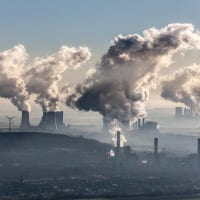Right now, oil is everywhere: powering cars, lorries, ships and planes. It moves people from place to place, provides heating for homes and offices, and is used to make plastic. You could even say we’re addicted to it.
But burning so much oil is causing climate change and threatening a future of extreme weather and sea level rise. We need to end our oil addiction if we want a liveable planet for future generations.
What is oil?
Oil – also known as crude oil, or petroleum – is a type of fossil fuel. Like coal and gas, it comes from the remains of dead bacteria, plants, and algae. Oil comes from dead marine life, buried and transformed under extreme heat and pressure over millions of years into carbon-rich oil that humans use as fuel.
Alternatives to oil
Advances in electric vehicles and improved public transport mean we’ll soon be able to do without oil for moving around on roads. Renewable energy sources like wind and solar can help switch power stations away from oil.
Biofuels are another alternative to using oil for heavier transport, including shipping. These fuels can often be used in existing engines. Biofuels include ethanol (produced primarily from Brazilian sugarcane and US corn) and biodiesel (made from vegetable oils and liquid animal fats).
In theory, biofuels are renewable. But in practice, growing the sugarcane, soy and corn for use in biofuels can use a lot of land – and can mean deforestation in important places for the climate like the Amazon rainforest.
Transport and Environment have calculated that you need 40 times more land to power a car using biofuels compared to an electric car powered by solar energy. That’s why it’s important that cars, buses and trucks should wherever possible be electric rather than running on biofuels. Planes too, although it’s harder there.
Oil and climate change
Burning oil is one of the biggest contributors to climate change – only coal has a greater impact.
Refineries turn crude oil into usable products used in transport – like gasoline (petrol) and diesel.
The International Energy Agency says that oil’s use in transport could start falling this decade.
Oil drilling pollution
Companies have long been going to greater and greater extremes to find new oil. This nearly always means polluting the environment through drilling and other forms of extraction, like from Canada’s tar sands.
Out at sea, this means devastating oil spills, destroying oceans and marine life. On land, oil drilling and pipelines also threaten spills and ignore the rights of Indigenous Peoples.
Oil drilling is a direct threat to communities near extraction sites and along pipelines. Major oil spills – such as the Exxon Valdez tanker accident and the Deepwater Horizon disaster – have polluted oceans and coastlines for decades after. Smaller leaks gush from active pipelines almost every day. These spills poison land and water supplies, and pose health risks to people living nearby.
In Canada, extracting oil from tar sands is expensive, uses a lot of energy, scars the landscape and poses risks to First Nations communities.
Oil companies and human rights
Oil companies are notorious for human rights abuses of local communities and Indigenous Peoples.
Shell has a long history of abuse and corruption (as well as pollution) in Nigeria. Chevron has left devastating pollution in Indigenous communities in Ecuador’s Amazon rainforest. And pipeline projects in North America, such as the Dakota Access Pipeline, saw peaceful protests led by Indigenous Peoples met with intimidation and violence.
Around the world, people are standing up to these companies with a single message: no more oil.
How to get the world off oil
The good news is that we’re winning. People around the world have stopped oil giants Shell, BP and Total from drilling in fragile environments, like the Arctic and the Amazon Reef.
Indigenous communities’ resistance has forced companies to pull out of building pipelines. And some global banks have refused to finance pipeline construction.
There’s still a long way to go. Oil companies are making record profits, even as the effects of climate change are becoming more and more obvious.
And oil is also used in plastics – including polyester for clothing and textiles – and other chemical products. Demand for oil in plastics is expected to rise as less oil is used in transport. And oil companies’ demand for oil for plastics is even threatening to weaken the Global Plastics Treaty.
Together we can get the world weaned off oil – and force the companies profiting from destruction to pay their fair share for the damage they’ve caused.


